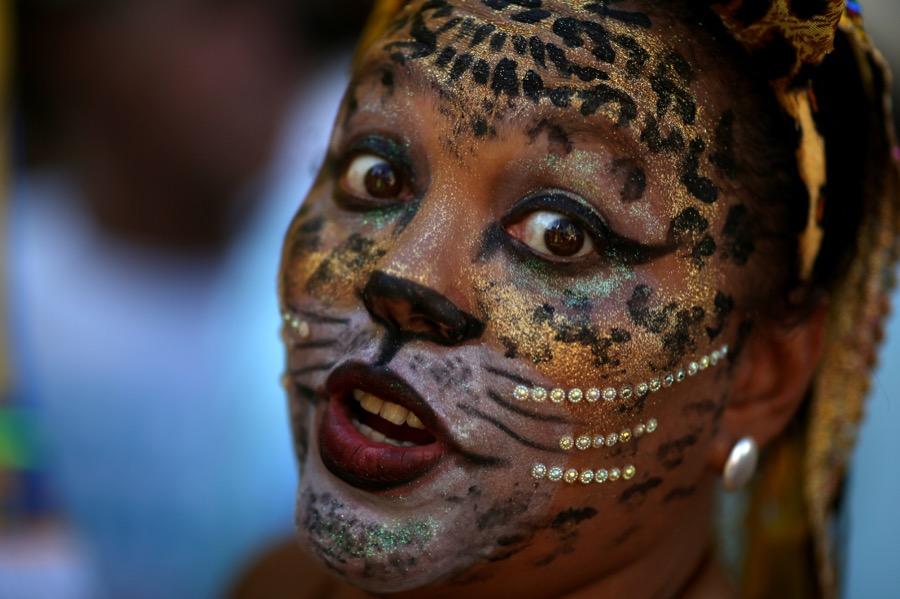Dozens of cities across Brazil are canceling Carnival
A reveler takes part in the Cordao de Boitata party during pre-Carnival festivities in Rio de Janeiro, Brazil on Feb. 19.
Brazil’s spectacular Carnival is kicking off this weekend, but some cities will be far more subdued than usual.
Rio de Janeiro is still hosting its glorious celebration. But dozens of other cities and towns across the country have been forced to cancel their official Carnival parades. Many just can’t afford it. Others are afraid it would unleash more violent crime.
The Terra news network reports that at least 70 cities have canceled their official Carnival. Many of them cited a lack of government money to pay for security for the celebrations, which tend to include raucous, alcohol-fueled street parties.
That’s a slice of the more than 5,500 municipalities in the whole country. But Terra says, besides the 70 cancellations, dozens of other smaller Carnival parties could also be scaled down because of financial strains.
Two years of brutal recession have left state and city coffers empty, from Curitiba, in Brazil’s south, to Fortaleza in the far north.
In Rio de Janeiro, the flagship Carnival city, things are no better.
Rio city faces an estimated budget shortfall of nearly $1 billion this year and the state of the same name is projecting a deficit of $6 billion.
In response, Rio’s governor is working to pass a slew of unpopular austerity measures. This has led to violent clashes between police and protesters in downtown Rio in recent weeks.
Earlier this month, Brazil deployed 9,000 federal troops to patrol the streets of Rio during the run-up to Carnival. The move came after rumors circulated that Rio’s military police might go on strike to protest delayed wages and poor working conditions.
That strike never materialized. On Tuesday, the federal government pulled the troops out, leaving the “Marvelous City,” as it is known, to take care of security itself as the revelers flood in.
In the neighboring state of Espírito Santo, an ongoing military police strike has led to looting and a wave of killings and assaults. At least 50 people have died in the violence. In early February, army forces were sent into towns and cities in the state, but the violence has continued. At least 29 cities in the state have canceled their Carnival parades for fear of sparking more trouble, according to Gazeta Online, a local news site in the city of Vitória.
Carnival is a huge deal for many Brazilians, and most towns and cities in this vast nation hold some sort of a parade or celebration to mark the beginning of Lent.
In Rio, musicians and dancers practice year-round to compete in large parades, where dance schools face off against each other in a riot of color, sound and sweat.
Carnival season is often accompanied by an uptick in crime, however. And in Rio violent crimes and robberies have been spiking since the onset of the financial crisis and since federal troops left town after the Olympics.
Related: Crime is getting even worse in post-Olympics Rio
But despite the relative chaos, Rio’s Carnival will go ahead as planned.
The annual celebrations are a much-needed cash cow for the city. Almost 1 million visitors came to Rio for the 2015 Carnival spending the equivalent of about $780 million, according to the state’s tourism department.
But to Cariocas, as Rio residents are called, the city’s Carnival is far more than an economic boost to the city.
After the global ridicule over embarrassing elements of the Rio Olympics (remember that green pool) and even sporting debacles like Brazil’s brutal 7-1 loss to Germany at the soccer World Cup in 2014, many Rio residents are overdue for a mental health break — and a few cold beers.
